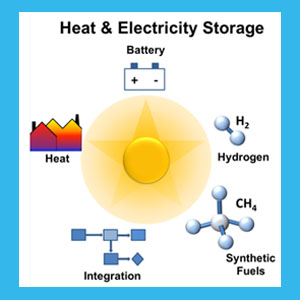Speaker
Dr
Alexander Rudnev
(University of Bern)
Description
Electrocatalytic conversion of CO2 into gaseous and liquid fuels has a great potential. However, significant conceptual and technological advances are still needed to make this process economically viable. Most studies on CO2 electroreduction were carried out using aqueous electrolytes. The solubility of CO2 in water is rather low, which leads to an undesirably low rate of mass transfer to the cathode. The use of non-aqueous electrolytes has the advantage of a significant increase in the CO2 solubility and allows avoiding intensive hydrogen evolution.
In this work, we investigate electrocatalytic activity of Au, Pt, Cu electrodes as well as of Cu-modified Pt(hkl) single crystal electrodes in electroreduction of CO2 in aprotic solvents, such as acetonitrile and propylene carbonate [1]. We demonstrate that the CO2 reduction is a structure sensitive reaction under these conditions. Cu deposition increases the activity of Pt electrodes. The highest catalytic activity was found for compact Cu deposits on Pt(110) surface. The effect of addition of water on the kinetics and mechanism of CO2 reduction is also explored. Moderate amounts of water (≤ 1 M) in aprotic media leads to a drastic change in CO2 electroreduction kinetics.
[1] Alexander V. Rudnev, Maria R. Ehrenburg, Elena B. Molodkina, Inna G. Botriakova, Alexey I. Danilov, Thomas Wandlowski, Electrocatalysis, 2014, DOI: 10.1007/s12678-014-0217-y
Author
Dr
Alexander Rudnev
(University of Bern)
Co-authors
Dr
Aleksei Danilov
(Frumkin Institute of Physical Chemistry and Electrochemistry RAS)
Mrs
Elena Molodkina
(Frumkin Institute of Physical Chemistry and Electrochemistry RAS)
Dr
Inna Botriakova
(Frumkin Institute of Physical Chemistry and Electrochemistry RAS)
Dr
Maria Ehrenburg
(Frumkin Institute of Physical Chemistry and Electrochemistry RAS)
Mr
Motiar Rahaman
(University of Bern)
Prof.
Thomas Wandlowski
(University of Bern)
Mr
Ulmas Zhumaev
(University of Bern)

